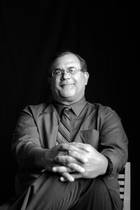
Richard N. Velotta
VEGAS INC Coverage
VEGAS INC coverage of the 9/11 anniversary
Las Vegas Sun coverage of the 9/11 anniversary
- 10 years after tragedy, is Las Vegas any safer?
- Reflecting on how Sept. 11 has changed our lives
- 9/11 memorial T-shirts fashioned into art at UNLV
- Reporter forced to face his own fears at Ground Zero
- Jon Ralston: What we’ve lost since Sept. 11
- Sun Editorial: Sobering anniversary brings memories, reminders of what’s important
- 10 years later, Las Vegas Sun photo of girl with flag still resonates
- Palo Verde students preserve 9/11 tradition — and teacher’s legacy
I remember the day I married my wife, the day my two children were born, the day John F. Kennedy was shot and the day the Challenger exploded.
I also remember September 11.
As someone who covers aviation, the radio news report of a small plane crashing into one of the towers of the World Trade Center got my attention.
Not long after I turned on CNN to see the live pictures of the tower on fire, I was stunned by a live shot of another plane—it looked like an airliner—crashing into the second tower.
At first, I was disoriented. That had to have been a tape of the plane hitting the tower, but it was a plane going into the other tower. WHAT IS GOING ON?!
As the day unfolded, we all became aware of how our world had suddenly changed. The industry I had loved and covered for years was suddenly a weapon of mass destruction.
I remember how eerie it was to walk outside and experience a quiet sky. No jet noise. No planes in the distance. Just silence.
As a reporter on the tourism beat, I had contact with McCarran during those horrible days when planes were grounded and visitors were stranded in Las Vegas. Hilarie Grey, now vice president of communications and government relations at the Nevada Cancer Institute, was McCarran’s public affairs manager on September 11.
She and her team gave round-the-clock briefings, passing along information to people too scared to even want to know the details.
Her vivid memories include the anguish of waiting for information on a plane belonging to Las Vegas-based National Airlines that had a similar flight number as one of the aircraft that had been unaccounted for.
Randall Walker, Clark County’s director of aviation, was attending a conference in Montreal and was stranded there the same way thousands were stuck here. Grey said she was never so proud of being part of a team as she was of the McCarran crew as Deputy Director Rosemary Vassiliadis stepped up and managed the crisis in Walker’s absence.
Grey estimated she gave 300 interviews in three days, all before the era of Facebook and Twitter.
Grey said she got chills learning of Sun City residents who called McCarran and offered spare rooms in their homes to stranded strangers.
I got my own chills hearing the late Keith Schwer of UNLV’s Center for Business Research describe his experience of being in the World Trade Center Marriott at the time of the attack. He told me he was thankful for the second chance he got.
Doug Parker was named CEO of US Airways less than a week before September 11 . He says two major changes to the industry resulted from the tragedy.
“The two biggest things are increased security and the acceleration of a financial shakeout that probably would have happened, in a compressed time frame,” he said. “The important thing is it can’t happen again because of all of the things that were done. People checking your shoes. No-fly lists. Reinforced cockpits.”
Southwest CEO Gary Kelly, said his wife was traveling during the September 11 attacks. He said the
country as well as the airline have undergone significant changes.
“On September 10, we were still issuing plastic boarding cards. When we started back up September 14, you could not do that. You had to have a boarding pass with your name on it. It really did push us into an accelerated conversion process with technology.”
When I hear people complain about the poor traffic design at the airport, I remind them that the taxi line crosswalk between the terminal and the parking garage exists only because federal authorities put limitations on parking close to the terminal.
As an adjunct instructor at UNLV, I taught a journalism class that met Tuesday nights, and I remember telling my students the evening after the attacks that they would never forget this day. I reminded them that the December 7, 1941, attack on Pearl Harbor was forever embedded in the minds of those who lived in that era.
This singular American tragedy would affect
them—and all of us—the same way.